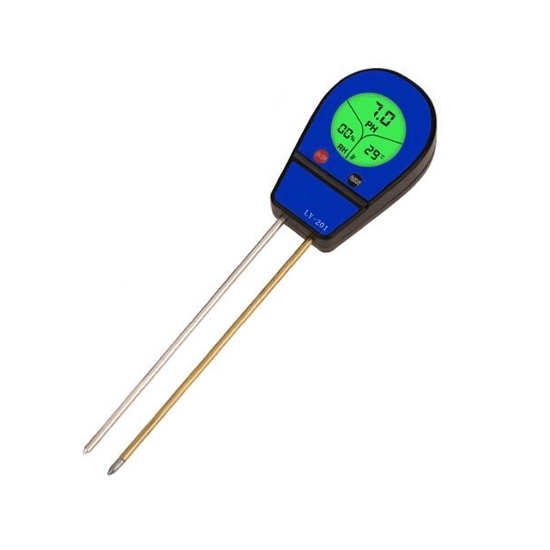
- Stock: In Stock
- Model: RDDLZ-MM-00LY201
- Weight: 1.00
- SKU: RDDLZ-MM-00LY201
Available Options
The soil pH and moisture meter measures temperatures from -10°C to 90°C, humidity from 0% to 90%, and pH from 3 to 9, with high precision (0.1°C, 1% humidity, 0.1 pH). Ideal for home gardens, greenhouses, and farms.
Specification
| Model | RDDLZ-00LY201 |
| Power Supply | 3 x 3V Button Batteries |
| Measurement Functions | Soil Moisture, Temperature, pH |
| Measurement Range | Temperature: -10°C ~ 90°C; Humidity: 0% ~ 90%; pH: 3 ~ 9 |
| Resolution | Temperature: 0.1°C, Humidity: 1%, pH: 0.1 |
| Product Dimensions | Length: 27 cm, Height: 4 cm, Width: 7 cm |
| Unit Weight | 0.12 kg |
| Quantity per Box | 100 units |
| Box Dimensions | 55 cm * 34 cm * 42 cm |
Features
- Multiple Readings on One Screen: Large LCD screen displays multiple readings, making it easy to view soil moisture, pH, and temperature at a glance.
- High Measurement Accuracy: Provides accurate measurements for soil pH, moisture, and temperature, ensuring reliable data for plant care.
- One-Button Measurement: Simple one-button operation for quick and easy measurement, ideal for both beginner and experienced gardeners.
- Automatic Shut-Off: Automatically powers off after 1 minute of inactivity to conserve battery life.
- Comprehensive Soil pH Testing: Measures soil pH levels to monitor and maintain the ideal acidic or alkaline balance for optimal plant growth.
- Soil Temperature Monitoring: Tracks soil temperature, allowing gardeners to create the best environment for plant survival, especially in variable weather conditions.
- Enhanced LCD Display Features:
- Large LCD screen for easy, multi-display interface.
- Backlit display for convenient reading in low-light conditions.
- Switchable between Celsius and Fahrenheit for temperature readings.
- Auto-off function after 60 seconds of inactivity to save power.
Size
Application
Tips: How frequently should I test my soil with this meter?
The frequency of testing depends on the specific needs of your plants and soil conditions. For delicate plants or crops with specific soil requirements, you may want to test the soil daily or every few days. For general garden use, checking once a week or every two weeks is usually sufficient to keep track of soil health. During periods of extreme weather, such as heat waves or heavy rainfall, testing more frequently can be beneficial to ensure that soil conditions remain ideal for plant growth. Regular testing allows you to spot trends in soil health and make timely adjustments.
